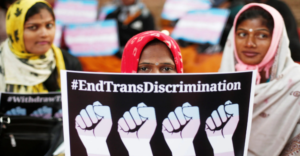“More than anything, a person’s right to abortion is a person’s right to their own body.” – Andrea Bian
What is abortion and why do women get them?
An abortion is the termination of a pregnancy by the removal of the embryo or fetus. When performed properly, induced abortion is one of the safest medical procedures. However, in developing countries, unsafe abortions are a major reason for maternal death. This is because of unskilled persons performing such procedures, or forced and impulsive abortions through medicines and harmful practices.
There are a lot of reasons why women get abortions. There can be a case of unplanned pregnancy, improper health, inability to financially support a child, domestic violence, or absent fathers. It could also be feeling they are too young to be pregnant or wish to pursue a career or education. There are immense risks a woman faces during pregnancy. There is also a huge amount of sacrifice it takes to give birth to and raise a child. Abortions largely remain legal in many countries only in cases of rape, poverty, fetal defects, or incest. There are two thought groups regarding abortion rights – Pro-Life and Pro-Choice.
The Sudden Uprise in Debate about Abortion Laws
In the recent Roe v. Wade controversy regarding abortion laws, attention has been brought to abortion laws around the world. The Pro-Life group of thought believes that the fetus is a living being. Therefore, abortion violates the right to live and abortion should be considered murder.
A Global Comparison of the Abortion Laws

Around the world, there are 24 countries where abortion is completely illegal, as of 2021.
The countries in which abortion is legal generally specify a certain gestation period. It can be as low as 6 weeks into pregnancy or as high as 24 weeks into pregnancy. Some countries also support gender-based abortions.
A lot of countries have abortions on request based on socio/economic conditions, issues of maternal health or to save the mother’s life.
There are restrictions and guidelines regarding abortions that include parental/spousal consent. It also includes restricting the usage of technology that determines the sex of the fetus before birth.
Abortion Laws in Different Countries
Countries like Senegal, Mauritania, Egypt, Laos, the Philippines, El Salvador, Honduras, Polta, and Malta have banned abortions in their territories. A lot of these countries have strict laws that label abortions as ‘aggravated homicide’, including cases of miscarriages.
In the European Union, Malta is the only country that bans abortion in all circumstances. There was a massive Pro-Choice movement in the country that called for these laws to be reversed. In contrast to this, Poland introduced a near-all-ban on abortions.
Countries like Venezuela, Nigeria, Iran, Libya, and Indonesia allow abortions if a woman’s health is at risk.
Liberal Abortion Laws
India has some of the most liberal laws regarding abortion. India’s Medical Termination of Pregnancy Act, 1972 earlier allowed abortion up to 20 weeks into pregnancy. An amendment in 2021 raised the limit to 24 weeks into pregnancy. It was for special cases of pregnancy like rape or incest survivors with a team of registered doctors.
Canada, Australia, and most of Europe allow free abortions without any restrictions for women up to 34 years old. Most European countries permit abortions within gestational time periods, but in some cases, it is allowed even later. In some countries like the UK, abortion is allowed right up to birth in cases of fetal disability.
In Colombia, the Causa Justa movement moved the Supreme Court to legalize abortion before 24 weeks of pregnancy. In 2018, in Ireland, a revolutionary change happened regarding the country’s restrictive abortion laws. Now, abortion up to 12 weeks into pregnancy is allowed.
Indian Abortion Laws
Indian Supreme Court in a recent historic decision ruled that all women, regardless of marital status, can obtain abortions up to 24 weeks into their pregnancies. Previously, under India’s abortion law, married women could have abortions up to 24 weeks into their pregnancies, but single women could have abortions up to 20 weeks only. But the court extended the 24-week period to all women. The judgment was cheered by reproductive rights activists, who said the court had ensured that the law does not discriminate against single women and expands their right to safe and legal abortions to them.
This ruling came in response to a Delhi High Court order from July 2022 which did not allow a pregnant woman’s request for abortion on the ground that rule 3B of the Medical Termination of Pregnancy Rules 2003 (as amended in 2021) does not extend to unmarried women. Rule 3B allows abortions between 20 and 24 weeks of pregnancy if there is a change in ‘marital status’ during pregnancy, including widowhood or divorce.
The Supreme Court declared that Rule 3B must also be extended to unmarried women who experience a change in their relationship (even if not marital) status, whether due to separation from, desertion by, or death of their partners.
The Supreme Court recognized a woman’s ‘decisional autonomy’ to exercise personal choices as a ‘self-governing’ individual. The court also acknowledged the magnitude of bodily responsibility imposed on women by an unwanted pregnancy, and the ‘cascading effects’ of such pregnancies on their education, career, and mental well-being. The decision to have or not to have an abortion is borne out of complicated life circumstances, which only the woman can choose on her terms.
The court’s decision will open the door to several new constitutional avenues for abortions in India. These avenues are especially important when seen against the regression (or stagnation) of abortion in countries that typically set, the legal agenda on abortion globally.
Conclusion
The simple fact of the matter is this — making abortions illegal does not stop the number of abortions. It makes a desperate woman look for unsafe means to abort the child, for no life at all is better than a miserable one. Making abortions illegal does not increase safe births, it increases the lengths to which the parents can look for ways to get rid of the baby. Making abortions illegal does not see a rise in the country’s youth, but only a rise in the population of orphanages and abandoned children.
-BY SAANVI KHATTER
Must Read: https://skchildrenfoundation.org/menstrual-awareness-a-small-step/





